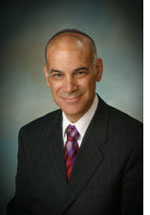By Rabbi Leonard Rosenthal

SAN DIEGO — Several years ago a stranger came to the synagogue office bearing gifts. She offered an old box filled with ten old Art Deco prints of Israel. I immediately fell in love with the stylized scenes of the Holy Land. When she said she wanted to donate them I asked if I could put them up in my office. She happily agreed. I had the ten prints framed and they have hung on the wall of my office ever since.
These prints reflect the style of the “Bezalel School.” The Bezalel School was an art movement in Palestine in the late Ottoman and British Mandate periods. It was named after the Bezalel Art School, which was the predecessor of the current Israeli Bezalel Academy of Art and Design. Bezalel was a Biblical artisan whom we meet in parashat Va-yak-hel.
Moses had appointed Bezalel as chief artisan for the construction of the Mishkan, the traveling tent in which the Israelites worshiped in the desert and the predecessor of the Temple in Jerusalem. The Torah says that God had endowed Bezalel, “…with a divine spirit of skill, ability, and knowledge in every kind of craft and has inspired him to make designs for work in gold, silver, and copper, to cut stones for setting and to carve wood-to work in every kind of designer’s craft-and to give directions.” (Ex. 35:31-34)
The Torah continues: “Let, then, Bezalel and Oholiab and all the skilled persons whom the Lord has endowed with skill and ability to perform expertly all the tasks connected with the service of the sanctuary carry out all that the Lord has commanded.” (Ex. 36:1)
Playing off an alternate translation of the Hebrew word ve-asah, which the JPS Tanakh translates as “Let, then,” Rabbi Mordechai Cohen understands this verse differently. Ve-asah also means “did.” Using this meaning of Ve-asah, Rabbi Cohen translates the verse in the past tense: “Bezalel and Oholiab and all the skilled persons whom the Lord has endowed with skill and ability expertly performed all the tasks connected with the service of the sanctuary and carried out all that the Lord has commanded.”
But then Rabbi Cohen ends up being troubled by the next verse in the Torah: “Moses then called Bezalel and Oholiab, and every skilled person whom the Lord had endowed with skill, everyone who excelled in ability, to undertake the task and carry it out.”
If Bezalel had already performed all of the tasks needed to build the Mishkan, why did Moses now have to call upon him? Wasn’t Bezalel already hard at work?
Rabbi Cohen (naturally!) has the answer to his question: building the Mishkan would be a complicated and intricate job. How, then, did Moses know that Bezalel was up the task? He did not call upon Bezalel hoping that he was up to the task, he observed him first.Moses had already seen Bezalel and his fellow workers performing the intricate types of work needed to build the holy structure. They had already proven their abilities and skills to Moses, so he was already confident that they would complete the exacting and complex task.
If there is one thing I have learned in my years as a rabbi, it is that actions speak louder than words. It is much easier to claim expertise than to demonstrate it. The only way we really know if someone’s skills are consistent with their claims is if they actually get the job done! The proof is in the pudding.
As Rabbi Shammai advised in Pirkei Avot, the best way to prove our abilities to others is not by boasting but by “saying little and doing much.” (Pirkei Avot 1:15)
*
Rabbi Rosenthal is spiritual leader of Tifereth Israel Synagogue in San Diego. He may be contacted at leonard.rosenthal@sdjewishworld.com